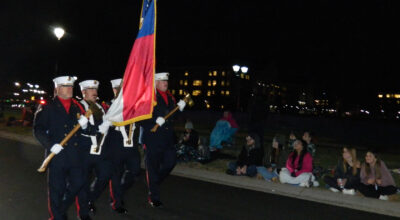Salisbury pastor elected dean of NALC
Published 12:00 am Tuesday, June 14, 2011
HICKORY— Rev. Carl M. Haynes of Salisbury, pastor of Christiana Lutheran Church, has been elected dean of the North and South Carolina region of North American Lutheran Church pastors.
His election came at the NALC Carolinas Chapter’s inaugural annual convocation to elect officers and approve a charter constitution.
A six-member executive council was elected to serve with Haynes. Three council members are to be pastors, and three are to be lay members.
The Hickory convocation was held about 22 months after a national vote in the Evangelical Lutheran Church in America (ELCA) forced a theological division over interpretation of scripture.
Some 150 delegates and visitors attended the recent two-day meeting at New Jerusalem Lutheran Church in Hickory, which was the first Lutheran church in the Carolinas to break away from the ELCA last September.
Congregations are still allowed to leave the ELCA following two separate votes of at least a two-thirds majority, at least 90 days apart.
A former pastor at Our Savior Lutheran Church in Dallas, N.C., Haynes has served as an NALC provisional dean for North Carolina for the past year, providing regional leadership to NALC pastors.
He led a workshop in Hickory to guide NALC congregational leaders on how to develop their new individual church constitutions.
Elected to serve with Haynes on the chapter executive council were the Rev. Randall A. Cauble of New Jerusalem, a Salisbury native; the Rev. Braxton East of Holy Trinity, Gastonia; the Rev. Ralph Kempski, retired former Bishop of Indiana-Kentucky ELCA Synod, now of Aiken, S.C.; Dennis E. Bollinger of Newton, a member of New Jerusalem; Stephen K. Suther of Troutman, a member of Grace Lutheran, Newton; and Franklin Merrill of Salisbury, a member of Union Lutheran.
The convocation also had representatives attending from three NALC-Carolinas mission congregations, including 10 members of Reformation Lutheran in New Bern, two members Advent Lutheran Church in Kings Mountain and five members from Trinity Lutheran in Fletcher.
Several pastors were recognized for the anniversaries of their ordinations, including the Rev. T.C. Plexico for 60 years service to the church; the Rev. Harvey Blume, 50 years; and the Rev. Randall Cauble, 25 years.
The Rev. Jason Sigmon of New Jerusalem, Hickory, was recognized for his service the past year as a provisional dean in the Carolinas Chapter.
On Aug. 19, 2009, the ELCA Churchwide Assembly in Minneapolis voted to allow the ordination and rostering of sexually-active homosexual clergy “in monogamous, committed, long-term same-sex relationships,” Haynes said.
The resulting philosophical split within the church, over whether Holy Scripture and the Lutheran Confessions would allow gays in the pulpit, actually goes back to the early 1990s, according to Haynes.
“More than just a family quarrel over how to respond to issues of ‘social justice,’” he said, “this argument is about what we believe and what we teach and has continued for decades. It’s about whether the church is still bound by God’s word, including the Ten Commandments, or whether it is now ruled by what is important to some men and some women.”
“It’s unfortunate that some in the ELCA try to cast this division as being about how Lutherans treat issues of homosexuality,” he said. “It’s much more about who rules the church, God or man, and whether to have sexually active gay pastors is the issue they (ELCA leaders) chose to challenge God’s authority.”
Development of the North American Lutheran Church was the primary project of Lutheran CORE (COalition for REnewal), a free-standing organization started in the 1990s to oppose the emerging liberal agenda within the ELCA. The NALC was officially constituted as a separate national Lutheran church at convocation in Columbus, Ohio, in August 2010.
Haynes explained that the NALC offers a “less top-heavy, decentralized church structure” that leaves “major policy decisions” to final approval by vote in local congregations. Besides being “Christ-centered and traditionally grounded,” he said, local churches also have wide latitude in missionary work to “make new disciples for Christ.”
At the meeting in Hickory, the general secretary of the NALC, headquarters in Columbus, the Rev. John F. Bradosky, gave a keynote address, led a forum on NALC issues and installed Haynes as regional dean at a closing worship service.
The preacher for the opening Friday worship was the Rev. Dr. Larry Yoder, pastor of Grace Lutheran in Newton, and a nominee for bishop of the NALC. Saturday afternoon, Yoder gave a theological presentation on how the church got to where it is now.
Following the convocation, Yoder and his wife, Marianne, hosted a picnic at their home for the leaders and guests.
The preacher at the Saturday worship was the Rev. Challa Baro, associate pastor and evangelist of Our Redeemer Oromo (African) Lutheran Church in Minneapolis. Pastor Baro is a native of Ethiopia, and the East African Oromo churches were among the first to leave the ELCA and join the North American Lutheran Church.
Nationally, the NALC has attracted some 80,000 Lutherans in more than 200 congregations in 10 months. During the same period, the Carolinas chapter has become one of the fastest-growing regions of the new church, increasing from fewer than five congregations to 25.





